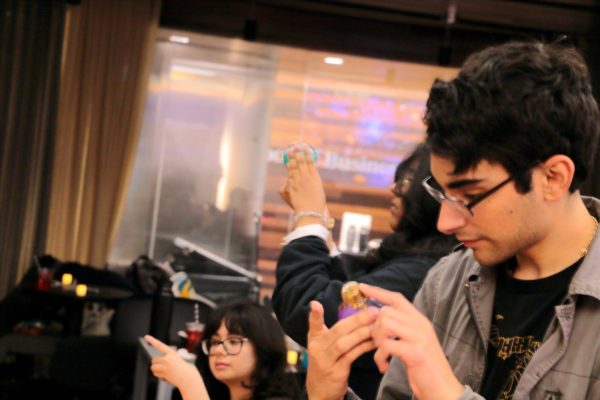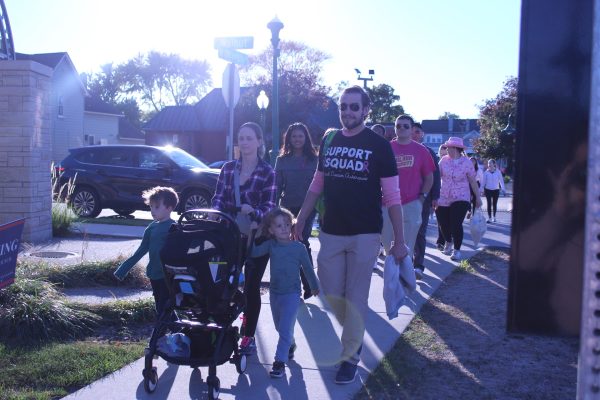COVID-19 school year influenced student academics, health
The majority of students have been learning online in the last year due to COVID-19, which has left an impact on their academics, mental health and overall well being. At Oakland University, these students had to learn to be flexible when coping with change.
In a 2020 survey conducted by University Recreation and Wellbeing via the iPause program, 55.1% of 272 students sampled reported high levels of stress on an average day.
“We’ve had to come up with very creative ways to kind of adapt, but it’s been a prolonged period of heightened anxiety and heightened stress … there could be a lot of serious effects that affect your emotional, psychological well being as well as your physical well being.” David Schwartz, director of the counseling center, said.
Adapting to online learning
OU has been operating mostly online since last March with only a small number of classes in person. Because of this, students had an ongoing effort to accommodate a new learning style and maintain their grade point average (GPA).
Kyle Gross, a senior one in the nursing program, has struggled to adapt to online classes and clinicals as someone who is a hands-on learner.
“As a student, I feel like I’ve regressed,” he said. “I feel like I’m definitely not as well-rounded of a student as I used to be … I just feel like I’m not learning as much.”
Gross has been using online simulations to recreate clinicals. While they are as close as it can be to the real thing, “nothing beats being in the hospital setting,” according to Gross.
For second-time bachelor’s student Summer Aldred, who is planning to get a degree in secondary education, the online setting has been convenient when it comes to balancing school with a full-time job.
“Online fits really well for the phase in life where I’m at,” she said. “I don’t have to schedule my work schedule around school, I can simply just do it when I’m done working, or before I’m working, and that’s been really, really helpful, and I don’t think I would have been as academically successful the past two semesters if I didn’t have that schedule.”
While Aldred reflects that she “probably wouldn’t be thrilled about this” as a first-time undergrad, freshman Maddie Kendall disagrees. A criminal justice major, Kendall has “liked [online learning] a little more than I would have thought.”
The university is currently working to create a safe return-to-campus plan that will expand possibilities for face-to-face instruction in the fall. Kendall, who finds her asynchronous classes to be convenient and autonomous, is “dreading” the return to in-person classes.
“I see that I’m doing a lot better with online classes than I would have thought,” she said. “I want to keep up what I’m used to. I think it would be a good experience to get some in-person classes, but I don’t think I would want my whole schedule to be in person.”
Coping with mental health and well being
With the adjustment to online learning and the isolation from COVID-19, overall student mental health has taken a toll.
“In terms of college students, at a view, this has definitely affected them,” Schwartz said. “We’re seeing more loneliness, isolation or depression, much much higher levels of anxiety, the types of things that you would kind of expect given the situation.”
Communication and public relations major Alison Manor is going into her senior year, and she misses the social element that she felt on campus in years past.
“It’s been very good for self reflection,” Manor said. “I just because I’m alone with my thoughts all of the time, but there is definitely that component missing from the college experience.
“I did get it before, since I’m a senior now, but I would say that I couldn’t imagine being a freshman right now and not having those connections that you make with people on your floor. I know that housing’s pretty empty so a lot of people don’t have roommates, so I would think that the loneliness would be pretty severe for some people.”
Kendall, who is living in the dorms this year, has struggled to meet new people. She is one of seven people living on her floor and the only one with a roommate.
“Making friends was just hard,” she said. “Only seeing people over zoom and not having any in-person classes, but the friends that I have made have been very personal connections just because we’re all kind of in the same boat of being like freshmen and not having a lot of [face-to-face] interaction.”
Some students, like Gross, chose to move back home this year. In Lansing for the semester, Gross has been feeling isolated.
“It’s almost impossible to make new friends,” he said. “Now, because of COVID, you can’t really go out that much.
“So that’s been tough, kind of just trying to do stuff by myself all the time, which I’m usually comfortable with, but now it’s a lot more challenging because I can’t go out to like a movie, or I can’t go out to town or something. It’s more or less just sitting in the house.”
Gross, who also serves as the director for campus health at Oakland University Student Congress, has noticed a sense of camaraderie among students in the face of the challenges COVID-19 presents.
“I’m proud of how well the university has and the students have embraced everything and have taken responsibility, and I know firsthand how challenging that can be, so kudos to every single person for doing so well with it,” Gross said.
OU is hoping to return to mostly in-person learning similar to how the university operated pre-pandemic, however they will be implementing social distancing measures if they are still suggested per Centers of Disease Control (CDC) requirements.





RODRICK RAJIVE LAL • Apr 17, 2021 at 11:28 PM
The Covid-19 Pandemic has definitely affected the academic performance of students worldwide. While most of them have been guinea pigs for the launch of online learning platforms, the rest have been left in a state of limbo, not really being able to even get into the virtual model. One thing is for sure, online learning has left all of us, teachers and learners exhausted, bewildered and somehow ‘zombified’! I very strongly believe that the Covid-19 pandemic, accompanied by online learning has led to the rise of a form of ‘mental health pandemic’ which is an equally alarming phenomenon.